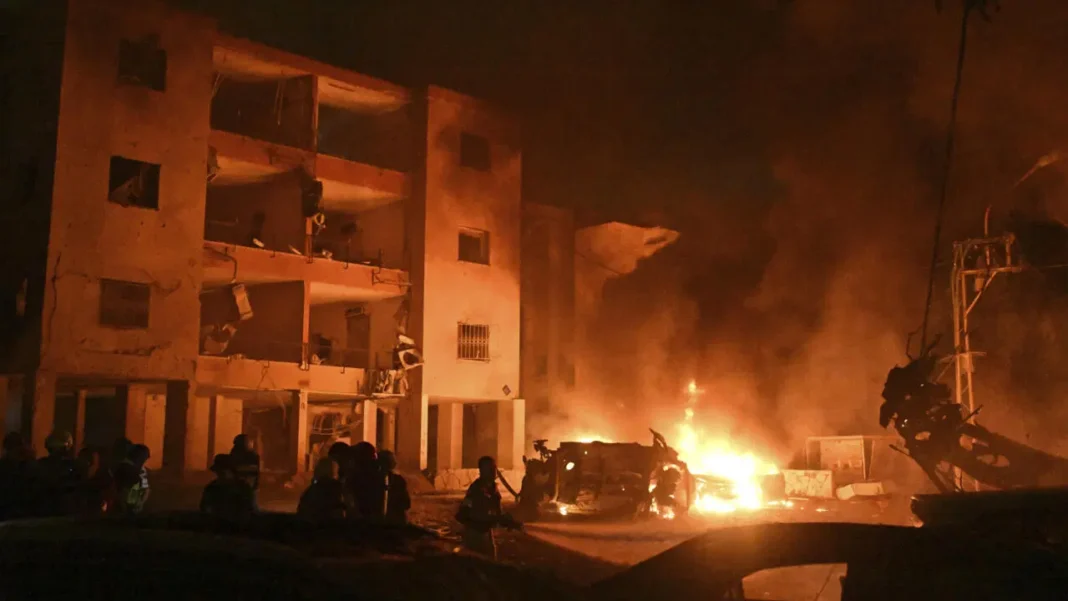Mass Exodus from Tehran as Israel-Iran Conflict Intensifies; Global Oil Prices Tumble 4%…Tensions between Israel and Iran have taken a dramatic and devastating turn, forcing over 330,000 residents of Tehran to flee the city in panic as fears of deeper military escalation mount.
The Israeli military launched a series of strikes on Iran that rattled the capital and sent shockwaves through the region.
In the days following the initial bombardment, highways out of Tehran were clogged with desperate families trying to escape what many fear could become a prolonged and more destructive conflict.
The sudden mass departure was largely triggered by direct warnings issued by the Israeli military, urging civilians to evacuate areas near key military and nuclear installations.
The strikes, which included precise attacks on radar and missile infrastructure, were met with alarm from residents who had already been on edge due to weeks of rising tensions.
Iran’s government, seeking to manage the internal unrest, referred to the attacks as “isolated terrorist acts” and moved quickly to impose internet blackouts in parts of the capital—a move that only deepened public fears and stirred rumors of more incoming strikes.
The atmosphere in Tehran turned chaotic almost overnight. Long lines formed at gas stations, food prices surged, and essential supplies became scarce.
With communications restricted and public services under strain, many residents took matters into their own hands and fled north toward less targeted areas, while others crossed into neighboring countries such as Turkey and Azerbaijan.
In the provinces surrounding Tehran, emergency shelters and makeshift medical stations were quickly overwhelmed as tens of thousands arrived, many with few belongings and no clear plans for their future.
In response to the humanitarian strain, aid organizations including the Red Crescent and Doctors Without Borders have mobilized resources, deploying mobile clinics and providing psychological support to those displaced by the violence.
READ MORE: Tinubu Cancels Kaduna Trip, Diverts to Benue Following Deadly Attack in Yelewata
Hospitals in the northern regions of Iran reported an increase in cases related to stress, trauma, and untreated chronic conditions.
Humanitarian corridors are being negotiated to allow safe passage for civilians, though the risk of further conflict remains high.
While the human cost of the escalating conflict grows, global financial markets are also feeling the impact.
Initially, oil prices spiked due to fears of a major supply disruption from Iran, one of the world’s largest oil producers.
Brent crude jumped by more than 7% immediately following the strikes.
However, prices fell sharply by nearly 4% after it became clear that Israel’s military operation had not targeted Iran’s major oil fields or nuclear facilities, easing concerns of a direct threat to the global energy supply.
Despite this brief market correction, the broader economic outlook remains uncertain.
Geopolitical instability in the region has led to a 20% surge in shipping insurance and transport costs for oil tankers passing through the Strait of Hormuz—a critical chokepoint for the global oil trade.
Analysts warn that even a minor disruption to shipping through this route could lead to major supply bottlenecks in Asia and Europe.
On the diplomatic front, former U.S. President Donald Trump weighed in on the conflict, urging Iranian leaders to return to negotiations and warning that continued escalation would lead to widespread devastation.
He claimed Iran was “losing” the conflict and emphasized that de-escalation was the only rational path forward.
The United Nations and the International Committee of the Red Cross have also issued urgent calls for restraint, appealing to both nations to prioritize the protection of civilian lives and infrastructure.
As the fifth day of fighting draws to a close, the situation remains fluid and dangerous.
With Tehran partially emptied and the threat of further strikes looming, the people of Iran are bracing for the worst.
The unfolding crisis has drawn the attention of the world, not just for its political implications but for the heavy human and economic toll it continues to exact.




